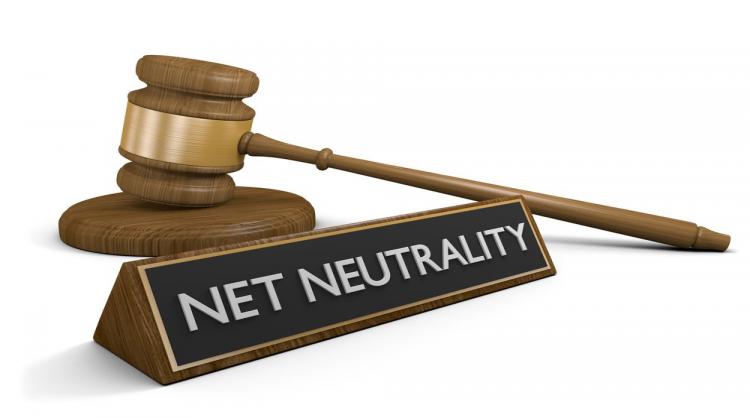Pai Launches New Effort to Kill Title II Internet Regulation
April 28, 2017 | by Andrew Regitsky

FCC Chairman Ajit Pai this week began his long expected effort to repeal and replace the FCC’s 2015 Open Internet Order which classified broadband Internet access service (BIAS) as a Title II telecommunications service and required all Internet traffic to be treated equally. According to Pai, the Commission will vote on a Notice of Proposed Rulemaking (NPRM) at its May 18, 2017 meeting and will begin accepting industry comments on July 17, 2017. An order could be issued late this year. The goals of the NPRM are to reclassify BIAS as a Title I information service and develop rules to regulate the Internet going forward with a “light touch.”
In a fact sheet published on April 26, 2017, the FCC stated that Title II Internet regulation had failed because:
Investment in broadband networks has declined.
Plans to deploy new and upgraded broadband infrastructure were shelved.
Thousands of good-paying jobs were lost due to lower infrastructure investment.
Americans’ online privacy was weakened because Title II completely stripped the Federal Trade Commission (FTC) of its authority over broadband providers’ privacy and data security practices.
While the Commission’s proposed less-intrusive regulation would do the following:
Spur broadband deployment throughout the country and thus bring better, faster Internet service to more Americans.
Create jobs by putting Americans to work deploying broadband networks and by creating the networks and online opportunities necessary for additional job growth and economic opportunity.
Boost competition and choice in the broadband marketplace. It will secure online privacy by putting the FTC—the nation’s premier consumer protection agency—back in charge of broadband providers’ privacy practices.
Restore Internet freedom by ending government micromanagement and returning to the bipartisan regulatory framework that worked well for decades.
In his new battle over the Internet, Chairman Pai will have three major tasks:
Pai will have to enunciate a sufficient legal rationale for changing the classification of BIAS back to that of an information service. To do so he will rely heavily on a 2005 Supreme Court decision that found that although BIAS includes a telecommunications component, a determination that this component is functionally integrated into a single information service offering is not an arbitrary or capricious conclusion.
Pai’s problem is that two years ago, the DC Circuit Court concluded that circumstances had changed and customers now viewed Internet access provided by an ISP and content provided by an edge provider as a single integrated telecommunications service. To get a court (the DC Circuit first, and probably the Supreme Court ultimately) to now accept that the original 2005 information service classification and not the current classification is the better choice, Pai will have to rely on data that purport to show that Internet investment has declined and jobs have been lost under Title II. However, that data is decidedly mixed, and since the 2015 Order is so recent, the Commission will only have one or two year’s worth of it. Good luck convincing a Democratic laden DC Circuit that this data is convincing!
The Commission should have better luck convincing a court that the so-called Internet future conduct standard is unlawful. That rule, which states that any person engaged in the provision of broadband Internet access service, shall not unreasonably interfere with or unreasonably disadvantage end users’ ability to select, access, and use broadband Internet access service or the lawful Internet content, applications, services, or devices of their choice, or edge providers’ ability to make lawful content, applications, services, or devices available to end users, provides the FCC with vague and unlimited power over virtually any Internet practice and would need to be made much more specific to be lawful. The new NPRM eliminates it completely.
Finally, the Commission will have to find a way to ensure that the bright line net neutrality rules are enforceable. These rules which forbid blocking, throttling or paid prioritization of Internet traffic are goals all ISPs have agreed to. However, voluntary commitments by ISPs to comply with these rules will clearly not be sufficient.
If BIAS is classified as a Title I information service, regulatory authority over ISPs reverts back to the FTC, leaving the FCC with only ancillary authority. Theoretically, the Commission could argue that section 706 of the Telecommunications Act which governs advanced services, provides it with the authority to work with the FTC to craft a sufficient enforcement mechanism, so it would still maintain some control over ISPs. However, the legal limits to such authority would be uncertain and likely tested in court. Thus, keeping the bright line rules legally in place if BIAS is an information service is going to be a very difficult task for this Commission. Of course, the Commission could choose to vacate the bright-line rules. However, that makes little sense since they have almost unanimous industry acceptance.
Despite the looming problem of writing a new Open Internet Order that will pass legal muster, the biggest battle the FCC will face is winning in the court of public opinion. Supporters of net neutrality have already cleverly labeled their efforts as “saving the Internet,” while Pai and the FCC are attempting to “kill the Internet.”
Control over the language used to describe the upcoming battle will undoubtedly be followed up with (1) millions of comments filed by consumers during the NPRM; (2) a TV and radio media blitz by consumer advocates; and (3) editorials by influential newspapers savaging Pai and the FCC. That is why we strongly believe that Pai is actually launching the NPRM to spur Congress into finding a legislative solution. A Congressional compromise would establish rules that would outlast any single FCC and would save this Commission from a long painful fight it is not certain to win.
By Andy Regitsky, CCMI

